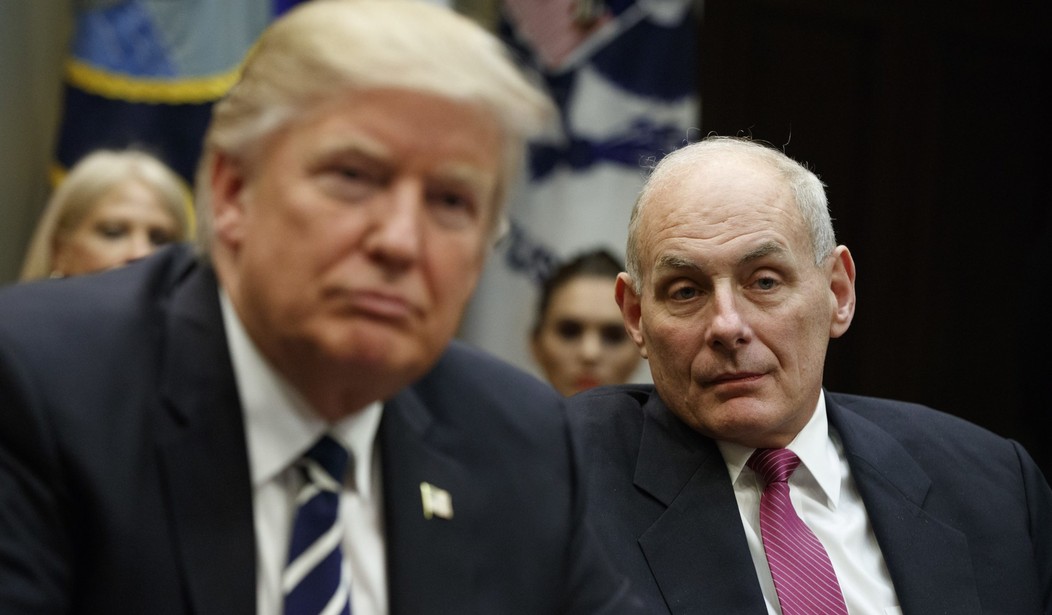On Tuesday, John Kelly, President Trump’s secretary of Homeland Security, published a six-page, single-spaced memorandum detailing new guidance on immigration enforcement. Thereupon, I spent about 1,500 words summarizing the guidance in a column at National Review. Brevity being the soul of wit, both the memo and my description of it could have been reduced to a single, easy-to-remember sentence:
Henceforth, the United States shall be governed by the laws of the United States.
That it was necessary for Secretary Kelly to say more than this — and, sadly, that such alarm has greeted a memo that merely announces the return of the rule of law in immigration enforcement — owes to the Obama administration abuses of three legal doctrines: prosecutorial discretion, preemption, and separation of powers (specifically, the executive usurpation of legislative power).
To the extent President Obama declined to enforce immigration law (notwithstanding his constitutional obligation to execute the laws faithfully), he did so under the guise of prosecutorial discretion. In the pre-Obama days, prosecutorial discretion was an unremarkable, uncontroversial resource-allocation doctrine. It simply meant that since resources are finite, and since it would be neither possible nor desirable to prosecute every crime, we target law-enforcement resources to get the most crime-fighting bang for the taxpayer buck. That means prioritizing enforcement action against (a) the worst offenders and (b) the unlawful causes of the activity.
This is easily illustrated by federal drug enforcement. There are comparatively few federal narcotics agents, compared, say, to police in a major city. But while both feds and cops have authority to arrest traffickers and consumers of illegal drugs, only federal jurisdiction is interstate and international. Consequently, the best use of finite federal enforcement resources is to limit them to prosecutions of significant felony importation and distribution offenses, leaving it to the states and municipalities to handle street pushers and misdemeanor violations involving the use of drugs.
Significantly, the fact that federal enforcement policy, which is made by the executive branch, does not target lesser felons or users does not mean this policy effectively repeals federal drug laws, which are written by Congress.
The non-targeted crimes are still crimes, and the feds reserve the right to prosecute them in appropriate cases (e.g., if they encounter these offenses in the course of carrying out other criminal enforcement missions).
In the area of immigration enforcement, Obama contorted this resource allocation doctrine into a de facto immunity scheme. That is, the Obama Homeland Security Department announced what it labeled enforcement “priorities.” If an illegal alien did not fit into the priorities, it was as if the alien were insulated against prosecution — effectively, it was as if there was nothing illegal about being an alien unlawfully present in the United States; it was as if Obama’s policies were a legal defense against Congress’s duly enacted laws.
This was complemented by a second legal distortion: Obama’s mangling of the so-called preemption doctrine. As we’ve noted, there are certain areas of law — like immigration and narcotics enforcement — in which the federal and state governments have concurrent jurisdiction: both are permitted to regulate and prosecute. This can work well (it generally does in drug enforcement); but it can be counterproductive if the dual sovereigns work at cross-purposes.
In some areas, like immigration, the courts have ruled that the federal government is supreme (on the dubious but now well-rooted theory that immigration law enforcement is primarily a federal responsibility). This means that the federal government has the power to preempt state action. Importantly, preemption is a power of Congress. That is, in an area of federal supremacy, states are prohibited to act in a manner that would contravene federal law.
Obama, to the contrary, took the position that states were forbidden to take action that contravened Obama immigration policy.
This was brought into sharp relief by the administration’s conflict with the state of Arizona. Far from seeking to countermand federal law, Arizona sought to enforce Congress’s statutes. Yet, Obama took the position that the state was bound not by Congress’s statutes but by Obama’s proclaimed enforcement policies — even if those amounted to non-enforcement of Congress’s statutes.
This was a perversion of both preemption and prosecutorial discretion. As long as Arizona was taking action consistent with federal law, its enforcement measures could not be preempted. Moreover, even if Arizona’s enforcement policy was broader than Obama’s, that should not have mattered: as we’ve seen, a federal exercise of prosecutorial discretion just means lesser crimes are not targeted, not that they are no longer crimes. If Arizona took action against those lesser crimes, that was completely appropriate; it was filling a gap in federal enforcement, not defying federal law.
The obstacles imposed by Obama’s immigration proclamations bring us to the third legal abuse: the usurpation of legislative authority. In effect, Obama’s announced priorities became not guidelines for immigration enforcement but new federal laws. According to the administration, only those aliens who fit Obama’s guidelines could be prosecuted. The Homeland Security Department was instructed to halt enforcement action at the earliest possible stage — i.e., once it was understood that an illegal alien did not fit a priority category, all investigative activity was to stop, even though it was known that the alien was acting illegally.
In effect, the Obama priorities operated like law. They controlled what federal investigators and prosecutors could do, and they were used to block states from enforcing their own laws. In this, at least for as long as Obama was president, they supplanted Congress’s laws — a clear violation of separation of powers.
All the Trump guidance announced in Secretary Kelly’s memo really does is repeal Obama’s decrees. The memo essentially says: the law of the United States is back to being the law of the United States. That’s the way it’s supposed to be.









Join the conversation as a VIP Member